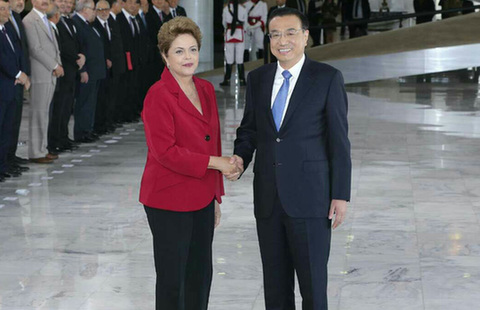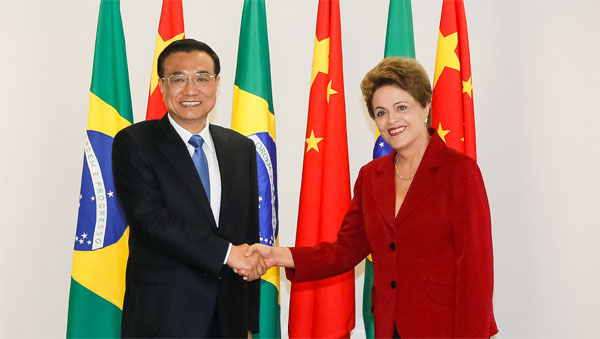China, Brazil launch new era of economic relations
Updated: 2015-05-20 07:43
By ZHAOYINAN in Brasilia and CHEN MENGWEI in Beijing(China Daily)
|
||||||||
|
Premier Li Keqiang and Brazilian President Dilma Rousseff greet each other at a meeting at the Planalto Palace in Brasilia on Tuesday. Li is on a three-day official visit to Brazil, where he began a Latin American tour that will include visits to Colombia, Peru and Chile. [Brazilian Presidency / AFP] |
Beijing signs deals worth billions of dollars and shares Olympic expertise
The country signed deals worth billions of dollars with Brazil on Tuesday, putting its economic influence in Latin America on a firmer footing.
The agreements will help Latin America's largest economy to battle a fifth straight year of poor growth and spiraling inflation.
Premier Li Keqiang and Brazilian President Dilma Rousseff watched the signing ceremony after several hours of talks in Brasilia that touched on a wide range of topics including trade, industrial cooperation and climate change.
"I would like to deepen exchanges with Brazil based on mutual understanding and the win-win principle. China-Brazil ties have benefited both peoples," Li said.
In addition, Beijing shared its experience of holding the Olympics with the next host country.
Under the agreements, the two countries will set up an action plan to encourage cooperation in industrial production, helping Brazil to improve its sagging infrastructure ahead of the 2016 Games in Rio de Janeiro. The plan will also upgrade two-way trade away from the current focus on resources to a more comprehensive, balanced pattern.
Wang Zhen, a former Chinese ambassador to Uruguay and Venezuela, said the action plan for industrial production marks the start of a new era of economic cooperation between China and Brazil.
"China is seeking to diversify its trade pattern by exporting more industrial production capacity, while Latin American countries rely too much on exports of raw materials," she said.
The deals also include the start of a feasibility study of a proposed transcontinental railway linking Brazil and Peru.
The Chinese-built, cross-Andes line is expected to connect cities on the Pacific coast in Peru with Brazil's Atlantic coast. The route would greatly reduce transportation costs in Brazil, especially for ore and soy.
China said in a joint statement that it will accelerate the approval procedure for 22 jetliners from Brazilian aerospace conglomerate Embraer. This is the first step toward completing the purchase of the 60 aircraft that were ordered during President Xi Jinping's visit to the region last year. China will also lift its ban on imports of Brazilian beef.
China has been Brazil's largest trade partner since 2009, accounting for 18 percent of the country's foreign trade. Despite a slight decrease, bilateral trade last year was $78 billion, according to the Brazilian authorities. China had invested more than $18.9 billion in Brazil up to last year.
Xu Shicheng, a research fellow in Latin American studies at the Chinese Academy of Social Sciences, said resource-rich countries, including the Latin American nations, have benefited greatly from selling raw materials such a sore and crude oil. China's rapid economic development generated growing demand and higher prices.
"However, the good old days ended when the global economy entered a period of recession, and the growth of the Chinese economy is slowing, too," he said.
"Life has become tough for these Latin American countries, which are eager to find new driving forces for their economies, and the cooperation over industrial capacity is one new engine."
Xu said Chinese companies should be fully aware of the slowdown in Brazil, where the economy is expected to slump this year.
Contact the writers at zhaoyinan@chinadaily.com.cn

 Jetman duo zip across Dubai sky
Jetman duo zip across Dubai sky
 Creativity marks graduation photos
Creativity marks graduation photos
 Ten photos you don't wanna miss - May 20
Ten photos you don't wanna miss - May 20
 In photos: Cities in the clouds
In photos: Cities in the clouds
 Premier Li Keqiang welcomed by Brazilian president
Premier Li Keqiang welcomed by Brazilian president
 Weirdest towns in the world
Weirdest towns in the world
 Students from vocational schools also make big bucks
Students from vocational schools also make big bucks
 Ten photos you don't wanna miss - May 19
Ten photos you don't wanna miss - May 19
Most Viewed
Editor's Picks

|

|

|

|

|

|
Today's Top News
China premier 'savior' to Brazil government: newspaper
US should end its 'backyard' zero-sum game
Xiaomi debuts in US, Europe with online store
More than 450 scholars urge Japan to address history issues
Brazil embraces third wave of Chinese investment
Taoist teaches US official one or two things about feng shui
White House bans police from using certain military equipment
China eyes 'capacity exports' to sustain growth
US Weekly

|

|







